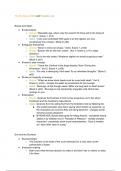The Duchess of Malfi and Paradise Lost
Bosola and Satan
● S malcontents
○ Bosola: “Miserable age, where only the reward/ Of doing well is the doing of
it.” (Act 1, Scene 1, p10)
○ Satan: “I who erst contended/ With gods to sit the highest, am now
constrained/ Into a beast.” (Book 9, p64)
● S disguise themselves
○ Bosola: “Never in mine own shape.” (Act4, Scene 1, p104)
○ Bosola: ‘Bosola, like an old man, enters.’ (Act 4, Scene 2, p110, stage
direction)
○ Satan: “for in the wily snake,/ Whatever slights non would suspicious mark.”
(Book 9, p61)
● S want to take revenge
○ Bosola: “I have this Cardinal in the forge already./ Now I’ll bring him
th’hammer.” (Act 5, Scene 4, p150)
○ Satan: “For only in destroying I find ease/ To my relentless thoughts.” (Book 9,
p62)
● D view on longevity of revenge
○ Bosola: “When we know black deeds must be cured with death.” (Act 5,
Scene 4, p148) - Accepts his death as punishment for his revenge
○ Satan: “Revenge, at first though sweet,/ Bitter ere long back on itself recoils.”
(Book 9, p64) - Revenge is only temporarily enjoyable until others take
revenge on you
● S deceptive
○ Bosola: deceives the Duchess to find out her pregnancy, lie to her about
Ferdinand and the Cardinal’s malevolence
○ Satan: deceives Eve into eating fruit from the forbidden tree by flattering her
■ The audience/reader sees them spying which builds up suspense, as
the characters do not know they are being deceived - changes power
dynamic across play/poem
■ D HOWEVER, Bosola feels guilty for killing Antonio - accidental nature
added in by Webster (not in ‘Paradise of Pleasure’ - morally complex
character) - possesses some moral characteristics. “Such a mistake
as I have often seen in a play,”
Eve and the Duchess
● D power/status
○ The Duchess is the head of the court whereas Eve is only seen as the
partner/wife of Adam
● S decision-making
○ Both know what the best decision to make is and don’t rely on others to make
it for them
, ○ The Duchess: “I have fashioned [a new plan] already.” (Act 3, Scene 2, p75)
○ Eve: “Or hear what to my mind first thoughts present.” (Book 9, p66)
● D independence
○ The Duchess acts to her own accord, whereas Eve is ‘guided’ by Adam and
doesn’t want to/can’t be independent
○ The Duchess: “I am Duchess of Malfi still.” (Act 4, Scene 2, p112)
○ Eve: (replying to Adam) “my guide/ And head.” (Book 5)
● S shown as greedy
○ The Duchess: (Bosola says) “how greedily she eats them”
○ Eve: ‘greedily she engorged without restraint and knew not eating death’
Adam and Antonio
● S admiration/love for partner
○ Antonio: “Let all sweet ladies break their flattering glasses/ And dress
themselves in her.” (Act 1, Scene 2, p19)
○ Adam: “to me beyond/ compare above all living creatures dear.” (Book 9, p66)
● D criticism
○ Antonio only admires the Duchess, whereas Adam has some criticism
towards Eve
○ Adam: “Too much of ornament in outward show/ Elaborate, of inward less
exact.” (Book 8)
○ Adam: “Nothing lovelier can be found in a woman than to study household
good and good works in her husband to promote.” (Book 9)
○ Antonio: “There speaketh so divine a continence/ As cuts off all lascivious and
vain hope.” (Act 1, Scene 2, p49)
● S protectiveness
○ Antonio: “For heaven’s sake, tend her well.” (Act 2, Scene 2, p49)
○ Adam: “The wife [...] safest and seemliest by her husband stays,/ Who guards
her, or with her the worst endures.” (Book 9, p68)
● D power/status
○ Adam knows he is more dominant and believes he should control Eve,
whereas Antonio allows himself to be commanded by the Duchess
○ The Duchess to Antonio: “Sit down./ Take pen and ink and write. Are you
ready?” (Act 1, Scene 2, p28)
○ Adam: “beauty is excelled by manly grace/ And wisdom.” (Book 4)




